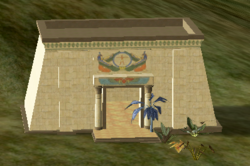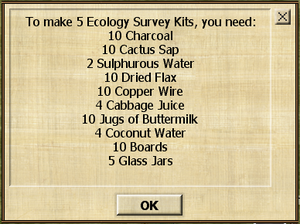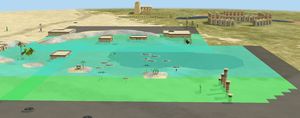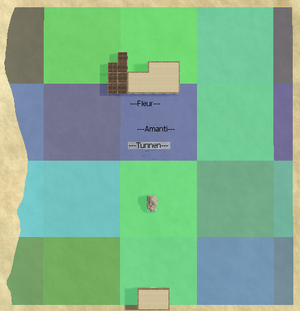Difference between revisions of "Ecology"
m (→top: clean up) |
|||
| (20 intermediate revisions by 7 users not shown) | |||
| Line 1: | Line 1: | ||
| − | |||
[[File:School.png|right|250px]] | [[File:School.png|right|250px]] | ||
| − | == | + | ==Sources== |
'''Ecology''' is a multi-level skill taught at the [[School of Body]]. | '''Ecology''' is a multi-level skill taught at the [[School of Body]]. | ||
| Line 24: | Line 23: | ||
|- | |- | ||
|Fourth || 9 || | |Fourth || 9 || | ||
| − | * 50 [[ | + | * 50 [[Buttermilk]] |
|| Phosphorus level | || Phosphorus level | ||
|- | |- | ||
| Line 30: | Line 29: | ||
* 10 [[Papyrus Paper]] | * 10 [[Papyrus Paper]] | ||
* 20 [[Cactus Sap]] | * 20 [[Cactus Sap]] | ||
| − | || Soot level | + | || |
| + | * Soot level | ||
| + | * Can produce Ecology Survey Kits | ||
|- | |- | ||
| Sixth || 13 || | | Sixth || 13 || | ||
| Line 38: | Line 39: | ||
|- | |- | ||
| Seventh || 15 || | | Seventh || 15 || | ||
| − | * 20 [[ | + | * 20 [[Salt Water]] |
* 5 [[Copper Wire]] | * 5 [[Copper Wire]] | ||
|| Salinity level | || Salinity level | ||
| Line 53: | Line 54: | ||
! Degree !! Test for !! Using !! Baseline !! Notes | ! Degree !! Test for !! Using !! Baseline !! Notes | ||
|- | |- | ||
| − | | First || Heavy metal pollution || [[Tadpoles]] ||align="right"| 0 || The more tadpoles die, the more heavy metals there are in the soil. <br>If more tadpoles are used, the reading becomes more precise. | + | | First || Heavy metal pollution || [[Tadpoles]] ||align="right"| 0% || The more tadpoles die, the more heavy metals there are in the soil. <br>If more tadpoles are used, the reading becomes more precise. |
|- | |- | ||
| − | | Second || Soil acidity || 1 [[Cabbage Juice]] ||align="right"| 7 || Standard pH scale. (Below 7 is acidic. Above 7 is alkaline.) | + | | Second || Soil acidity || 1 [[Cabbage Juice]] ||align="right"| 7.0000 || Standard pH scale. (Below 7 is acidic. Above 7 is alkaline.) |
|- | |- | ||
| − | | Third || Ground water level || 1 [[Dried Flax]] ||align="right"| | + | | Third || Ground water level || 1 [[Dried Flax]] ||align="right"| 50% || |
|- | |- | ||
| − | | Fourth || Phosphorus level || 2 [[ | + | | Fourth || Phosphorus level || 2 [[Buttermilk]], 1 [[Dirt]] ||align="right"| 25% || |
|- | |- | ||
| − | | Fifth || Soot level || 1 [[Papyrus Paper]], 1 [[Cactus Sap]] ||align="right"| 0 || | + | | Fifth || Soot level || 1 [[Papyrus Paper]], 1 [[Cactus Sap]] ||align="right"| 0% || |
|- | |- | ||
| − | | Sixth - A || Nitrogen Level || 1 [[ | + | | Sixth - A || Nitrogen Level || 1 [[Golden Asp]], 2 [[Charcoal]] ||align="right"| 25% || |
|- | |- | ||
| − | | Sixth - B || Potassium Level || 1 [[Sulphurous Water]], 2 [[Charcoal]] ||align="right"| | + | | Sixth - B || Potassium Level || 1 [[Sulphurous Water]], 2 [[Charcoal]] ||align="right"| 25% || |
|- | |- | ||
| − | | Seventh || Salinity || | + | | Seventh || Salinity || 1 [[Salt Water]], 1 [[Copper Wire]] ||align="right"| 0% || |
|} | |} | ||
| Line 74: | Line 75: | ||
This is a new feature that allows visualizing ecology over a large area, rather than a single point. | This is a new feature that allows visualizing ecology over a large area, rather than a single point. | ||
| − | * Ecology Survey Kits are made on a chemistry lab. Five kits are made at a time. | + | * Ecology Survey Kits are made on a chemistry lab (requires Ecology Level 7). Five kits are made at a time. |
[[Image:EcoKits.png|thumb|Materials needed to make Ecology Survey kits.]] | [[Image:EcoKits.png|thumb|Materials needed to make Ecology Survey kits.]] | ||
| − | * Select the Ecology type you want and see a colored grid for 2 minutes. | + | * Select the Ecology type you want and see a colored grid for 2 minutes. |
| − | * Colors on 500' x 500' grid represent levels. | + | * Colors on 500' x 500' grid represent levels. |
| − | * The results have been described as a "heat map" style. | + | * The results have been described as a "heat map" style. |
'''Transcript of Malard's demonstration in Meshwesh:''' | '''Transcript of Malard's demonstration in Meshwesh:''' | ||
| Line 92: | Line 93: | ||
i trust this will make the game way more enjoyable | i trust this will make the game way more enjoyable | ||
| − | as you won't get confused why veg stops growing etc | + | as you won't get confused why veg stops growing etc. |
you can use this mechanic to track down the cause | you can use this mechanic to track down the cause | ||
| Line 192: | Line 193: | ||
and sulfur water instead | and sulfur water instead | ||
| − | (question: will there be any way to force value changes? | + | (question: will there be any way to force value changes? i.e.: force green to turn blue etc.?) |
yes, but that's you playing the ecology game | yes, but that's you playing the ecology game | ||
| Line 205: | Line 206: | ||
While the people of Egypt have traditionally recorded ecological findings on pages related to "pollution," the ''depletion'' of water and nutrients can be as harmful to agricultural activities as the addition of pollutants. Therefore, it is important to examine both the upper ''and'' lower tolerances of crops, etc. | While the people of Egypt have traditionally recorded ecological findings on pages related to "pollution," the ''depletion'' of water and nutrients can be as harmful to agricultural activities as the addition of pollutants. Therefore, it is important to examine both the upper ''and'' lower tolerances of crops, etc. | ||
| + | |||
| + | [[Vegetable Ecology]]<br> | ||
| + | [[Mushroom Ecology]]<br> | ||
| + | [[Camel Ecology]] | ||
=== Guilds Studying Ecology === | === Guilds Studying Ecology === | ||
| − | + | [[Category:Skills]] | |
| − | |||
| − | |||
| − | |||
| − | |||
| − | |||
| − | + | {{L|en}} | |
Latest revision as of 15:24, 13 May 2021
Sources
Ecology is a multi-level skill taught at the School of Body.
Cost
| Degree | Level | Cost | Test For |
|---|---|---|---|
| First | 3 |
|
Heavy Metal |
| Second | 5 | Soil Acidity | |
| Third | 7 |
|
Ground Water level |
| Fourth | 9 |
|
Phosphorus level |
| Fifth | 11 |
|
|
| Sixth | 13 |
|
Nitrogen (A) Potassium (B) levels |
| Seventh | 15 |
|
Salinity level |
Use
There are two ways to use the Ecology skills: Single point sample tests, and Ecology Survey Kits.
Single Point Tests
| Degree | Test for | Using | Baseline | Notes |
|---|---|---|---|---|
| First | Heavy metal pollution | Tadpoles | 0% | The more tadpoles die, the more heavy metals there are in the soil. If more tadpoles are used, the reading becomes more precise. |
| Second | Soil acidity | 1 Cabbage Juice | 7.0000 | Standard pH scale. (Below 7 is acidic. Above 7 is alkaline.) |
| Third | Ground water level | 1 Dried Flax | 50% | |
| Fourth | Phosphorus level | 2 Buttermilk, 1 Dirt | 25% | |
| Fifth | Soot level | 1 Papyrus Paper, 1 Cactus Sap | 0% | |
| Sixth - A | Nitrogen Level | 1 Golden Asp, 2 Charcoal | 25% | |
| Sixth - B | Potassium Level | 1 Sulphurous Water, 2 Charcoal | 25% | |
| Seventh | Salinity | 1 Salt Water, 1 Copper Wire | 0% |
Ecology Survey Kits
This is a new feature that allows visualizing ecology over a large area, rather than a single point.
- Ecology Survey Kits are made on a chemistry lab (requires Ecology Level 7). Five kits are made at a time.
- Select the Ecology type you want and see a colored grid for 2 minutes.
- Colors on 500' x 500' grid represent levels.
- The results have been described as a "heat map" style.
Transcript of Malard's demonstration in Meshwesh:
- First few lines not caught, but essentially he said the current system is staying, but level 5 no longer needs insects. Using an advanced chemistry lab you can make a kit that lets you create the heat map type images (see screenshots).
- Verbatim:
okay, so this is how I am 'fixing' ecology
there are no changes to the mechanics
just making it easier for you to visualise
i trust this will make the game way more enjoyable
as you won't get confused why veg stops growing etc.
you can use this mechanic to track down the cause
i'm not telling you what the colours mean
you can use the existing ecology mechanics to derive the values
this is an overview addon
so you know where you need to probe
and where you don't need to probe
i.e. where i am stood
all around me is one 'value'
and here is another <moved to a different colour square>
so you can simplify your testing by only testing each colour change
rather than every co-ord in the game
(question: so the values aren't known, we have to test for them?)
you need to test for the exact numerical value
but as your knowledge grows
you can infer rough values based on colour
so once you know blue = 'value'
and greens = 'another value range'
then you might just go, okay onions need blue spots in the eco map
please take my example as fake news
but this should help you figure it out
any questions?
(question: will the grid be visible for everyone, like yours here in the demo? or will it only be visible for the user of the kit?)
(question: what is range for us?)
yes
the kit will deploy a time limited range
so you need to make more kits
(they won't be that expensive)
(question: how do we get the kit?)
(question: this grid contains every pollutant?)
(question: and only the one with kit can see?)
but they will pop up for 2 minutes or so
no, anyone can see it
like you see it now
the kit will let you pick a single pollutant to view
so if you want to see all 7 pollutants in a 500x500 grid
you need 7 kits
(question: will the kit be a consumable?)
yes
but they won't be expensive
(question: skill or test?)
you need advanced chem
and ecology level 4 or above to make the kit
then you need each ecology level to test for
but i've removed insects
and metal blue
its copper wire
and sulfur water instead
(question: will there be any way to force value changes? i.e.: force green to turn blue etc.?)
yes, but that's you playing the ecology game
(question: eco 4 to make kit what about to use it)
(question: more to the point, can we UNpollute?)
<departed for Hyksos>
Research
While the people of Egypt have traditionally recorded ecological findings on pages related to "pollution," the depletion of water and nutrients can be as harmful to agricultural activities as the addition of pollutants. Therefore, it is important to examine both the upper and lower tolerances of crops, etc.
Vegetable Ecology
Mushroom Ecology
Camel Ecology
Guilds Studying Ecology



